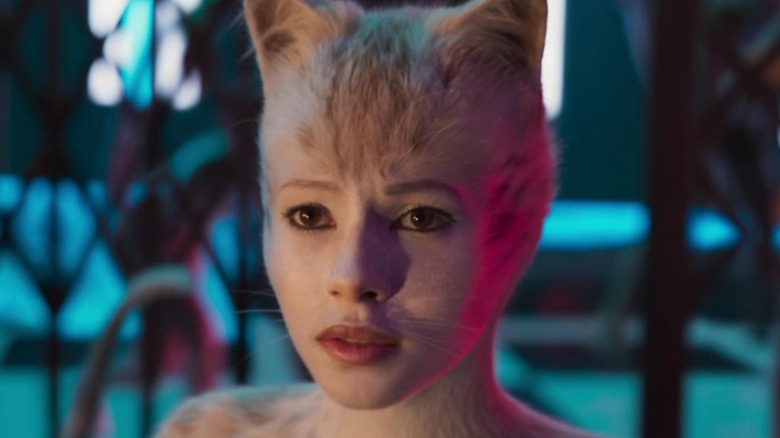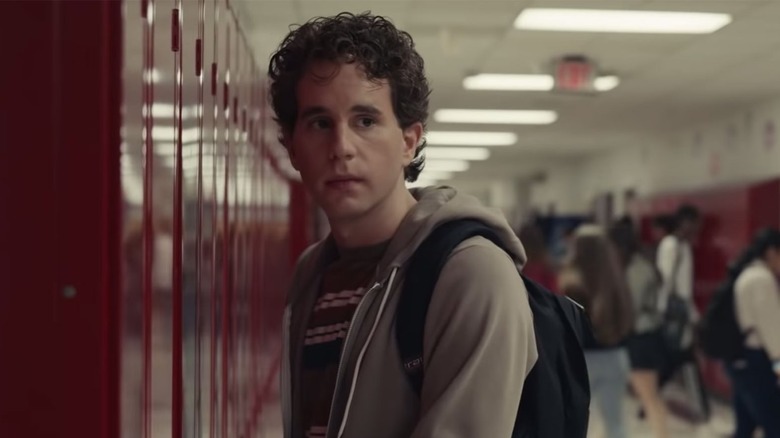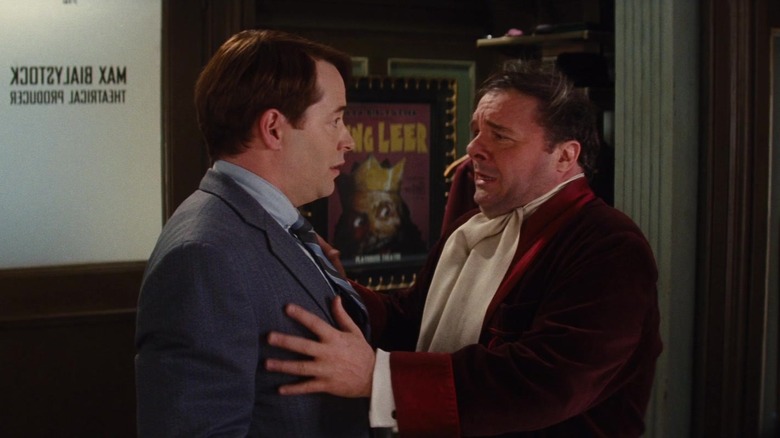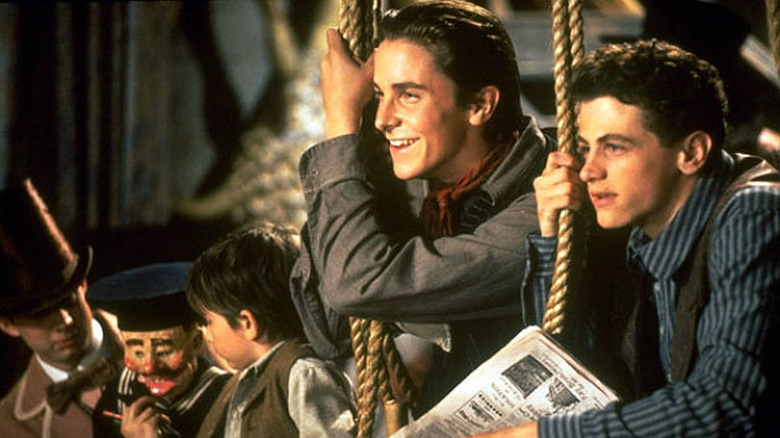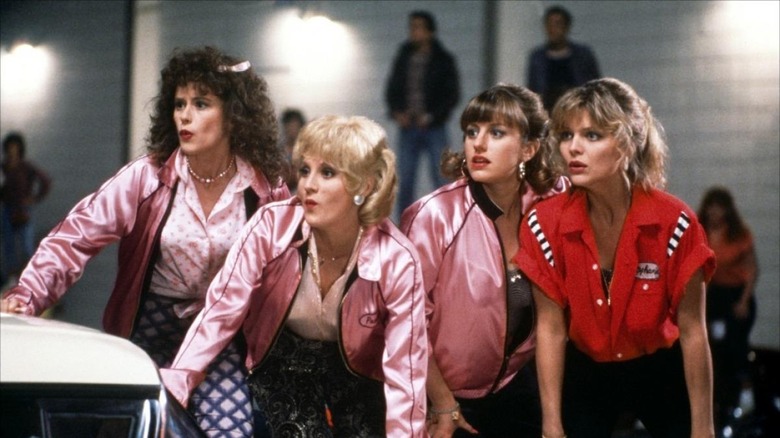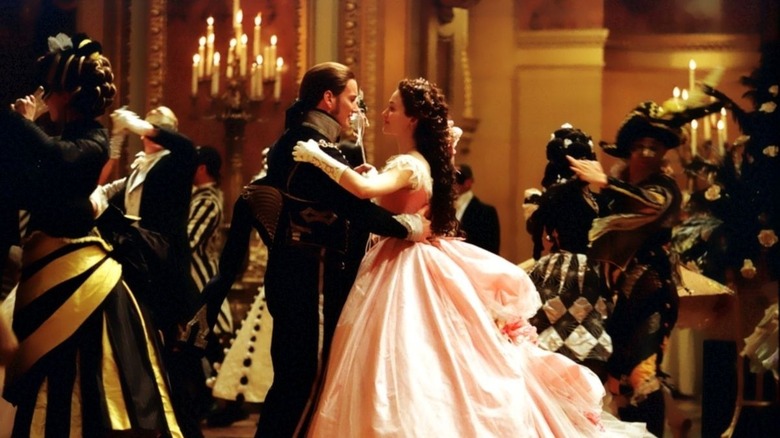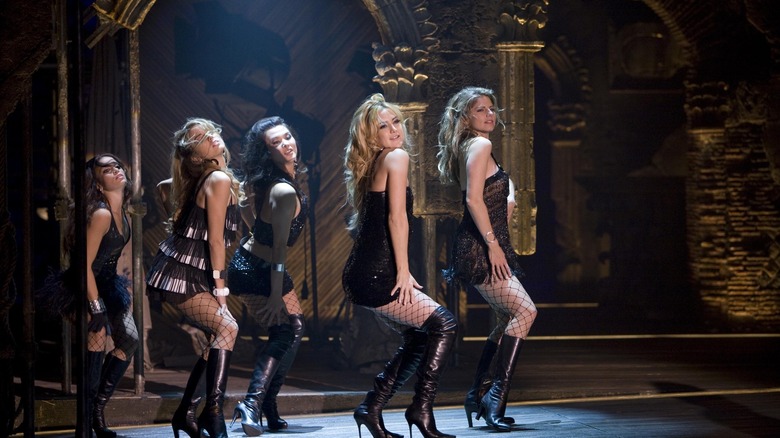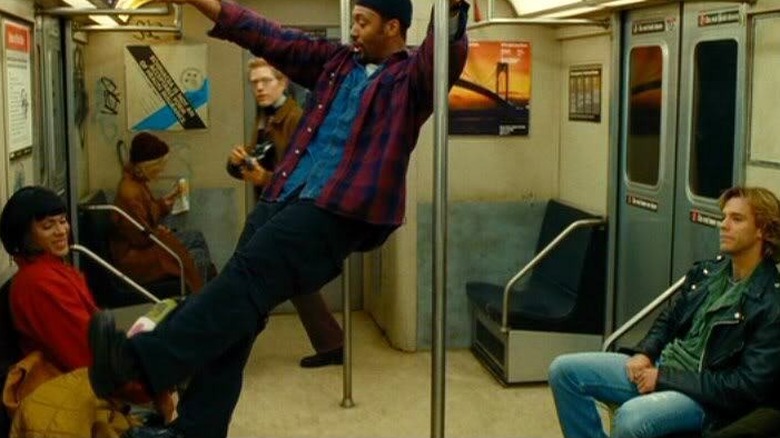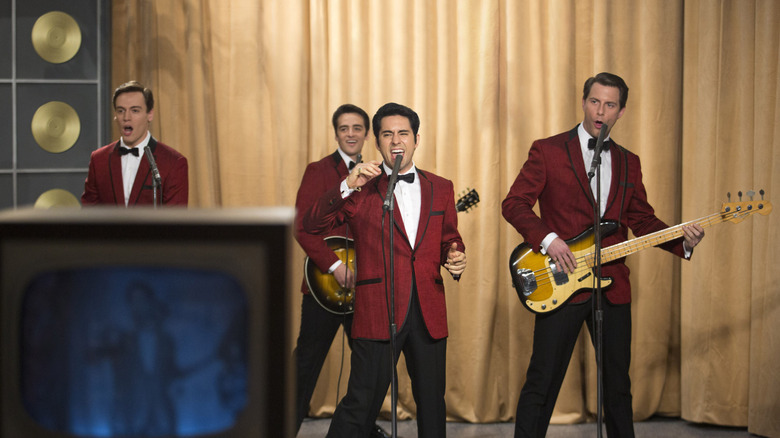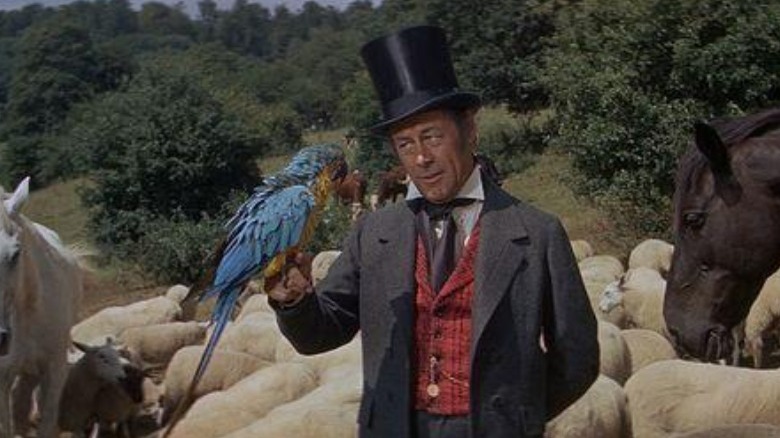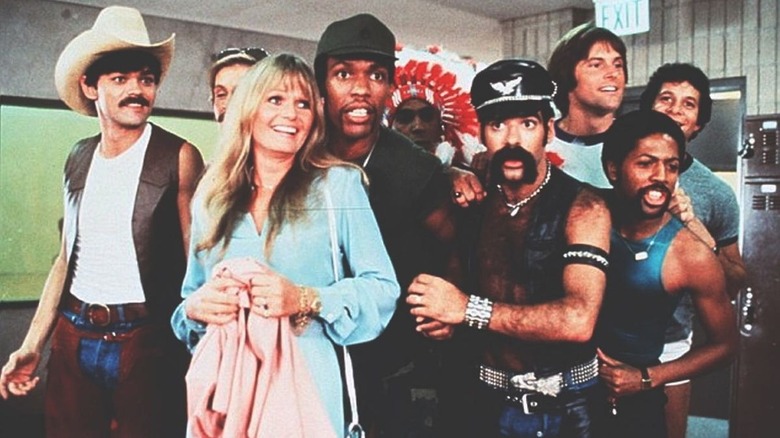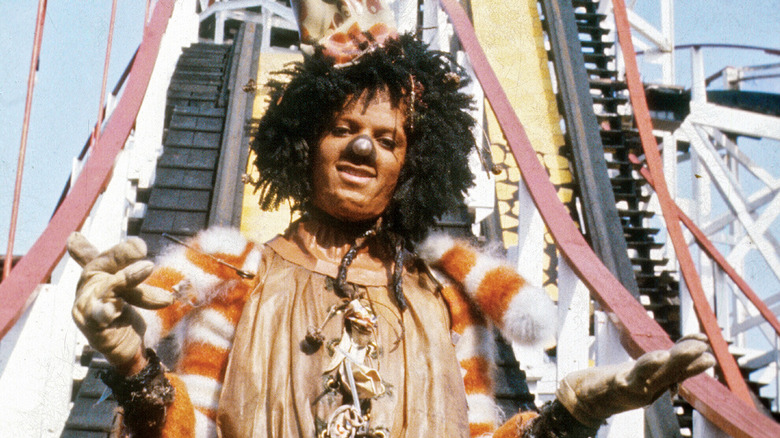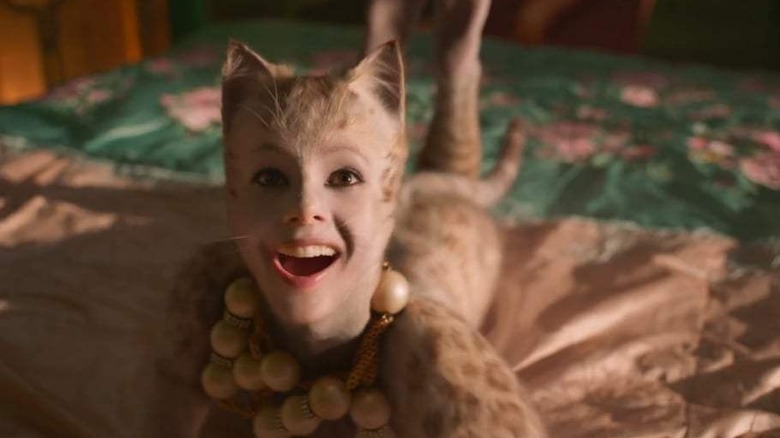The Real Reason These Musical Movies Flopped
The modern age of cinema has seen a resurgence of musicals becoming box office hits. These include major Broadway adaptations like "Into the Woods" and "Les Misérables," but happily, all the financial love has extended to original projects like "The Greatest Showman" and "La La Land." When done right and with a story that resonates with people, moviegoers can't resist a toe-tapping musical that puts a song in their hearts and earworms they can't get rid of.
Of course, that doesn't mean all musical movies excel, even modern ones. On the contrary, the long history of American musicals at the global box office is jam-packed with projects meant to be the next "Chicago" but instead became major money-losers.
These failed productions aren't just obscure films from bygone eras that modern audiences wouldn't be familiar with, as they also include lavish big-budget adaptations of modern musicals that earned all kinds of love at the Tonys. Even with such acclaimed brand names, these musicals, for a wide variety of reasons, couldn't avoid doom at the box office. Musicals may be having a moment in the current box office landscape, but as history has repeatedly proven, that doesn't mean this genre is anywhere near financially bulletproof.
Dear Evan Hansen
At one point in time, a "Dear Evan Hansen" movie adaptation must've seemed like a great idea. After all, the original musical was a Tony-winning smash hit, and a film version could fit right into the mold of modern hit teen dramas like "The Fault in Our Stars." On paper, there seemed to be a lot going for this project. Unfortunately, once it finally hit theaters in September 2021, "Dear Evan Hansen" was as much an extraordinary box office non-starter as the original stage musical was a massive success.
"Dear Evan Hansen" took in just $17.2 million at the worldwide box office, $15 million of which came from its domestic run. There were several issues with this movie, including the controversy over the casting of Ben Platt as the titular teenage protagonist of the story. Further hurting the project was how its grim subject matter was a heavy contrast to the light and bubbly storylines that define other modern hit musicals like "The Greatest Showman." Plus, "Dear Evan Hansen" wasn't as famous of a brand name with the general public as other Broadway shows like "Wicked" or "Les Miserables." Add in a swarm of negative reviews and it becomes obvious why this initially can't-miss proposition turned into a box office dud.
The Producers (2005)
The premise of "The Producers" hinges on the idea that, under the right circumstances, a flop could be more profitable for the producers of a Broadway musical than a hit. Surely everyone involved in financing the 2005 musical movie adaptation of "The Producers" wishes that was always true, since this project ended up being a major box office misfire. This was despite the original Broadway musical version of the property, which also starred Nathan Lane and Matthew Broderick, being an acclaimed smash that scored that several Tony Award wins, including one for best musical.
That same level of success wasn't in store for the film adaptation of the Broadway property, as the 2005 take on "The Producers" took in only $32.5 million worldwide on a $45 million budget. This dismal haul included just $19.3 million in North America, despite the title opening on Christmas Day 2005. While this holiday has been a prime launchpad for musicals in the past, "The Producers" failed to catch fire due to the failure of its marketing to reach people who weren't already enamored with the original Broadway musical. It didn't help that the original 1967 Mel Brooks classic cast a wide shadow that would be difficult for any new film incarnation of the property to escape. If only there were a way to make flops into guaranteed moneymakers!
Newsies
Today, "Newsies" is a highly regarded musical that's spawned a multimedia franchise for Disney, including a successful Broadway adaptation. But there was a time when "Newsies" was just another live-action Disney flop from the 1990s. Before it grew a cult following and was translated into other forms of media, "Newsies" grossed only $2.7 million on a $15 million budget during its brief April 1992 theatrical run, an atrocious sum.
To understand why "Newsies" didn't just do poorly but flat-out cratered, one has to understand the pop culture landscape it was released in. Live-action musical films were almost nonexistent in the American film landscape in the early 1990s. The scarcity of this genre was reflected in the Los Angeles Times' observation that "Newsies" was the first live-action musical released by Walt Disney Pictures since "Pete's Dragon" in 1977! It was always going to take a massive pop-culture juggernaut to shatter the low status of the musical at this point in time and, unfortunately, the mixed marks "Newsies" received, not to mention its unusual premise, ensured that audiences stayed away. Unlike other musical movie bombs, though, "Newsies" would go on to have a long second life thanks to that Broadway musical adaptation.
Grease 2
When it arrived in theaters in 1978, "Grease" was unstoppable. As noted by Vanity Fair, the film was an enormous smash, making it the rare post-1969 musical to take off like a rocket at the domestic box office. With featuring the word "Grease" on it becoming a license to print money, it was inevitable that Hollywood would look at all that success and see an opportunity to craft a sequel. Such a follow-up emerged in 1982 in "Grease 2," which ended up being as much of a dud as its predecessor was a roaring success.
In its box office run, "Grease 2" only grossed $14.2 million, a minuscule amount compared to its predecessor and also tiny for any major wide release in 1982. Part of the problem here was that "Grease 2" focused on largely new characters. Rather than promising moviegoers the return of their favorite "Grease" characters, "Grease 2" looked like any teenage musical that just so happened to have a familiar brand name. Even more devastating was the competition "Grease 2" faced in the summer of 1982, as titles like "E.T. the Extra-Terrestrial" and "Poltergeist" dominated the box office landscape. This new bouncy musical didn't fit in with the pop culture zeitgeist, nor did it garner enough positive buzz to draw people in. While the original "Grease" had a box office run full of groove and feeling, "Grease 2" was the box office equivalent of a beauty school dropout.
The Phantom of the Opera
"The Phantom of the Opera" isn't just a famous Broadway musical, it's one of the seminal entries in the form of the 20th century. Arguably the most famous work from Andrew Lloyd Webber, a feature film adaptation of a musical this beloved should've been a guaranteed event movie. Coming out two years after "Chicago" re-energized musical films at the box office, though, "The Phantom of the Opera" just didn't drum up much interest from moviegoers. Its $153 million worldwide box office haul was bigger than other musical movie box office duds, but it was still an extremely disappointing haul for a project with such massive hype and iconic source material.
Part of the issue here was the largely negative critical response to "The Phantom of the Opera," a sharp contrast to the acclaim surrounding the original Broadway musical and an indicator to diehard fans of the property that something went wrong in the adaptation phase. There were also plenty of other options for adult moviegoers to check out during the holiday season of 2004, including "The Life Aquatic with Steve Zissou" and "The Aviator." It didn't help that there weren't many big names in the cast that could help attract prospective moviegoers, with leading man Gerard Butler still being years away from his breakthrough in "300." So while the tormented romance of "The Phantom of the Opera" was revolutionary on Broadway, it ultimately proved disappointing in generating remarkable theatrical box office.
Nine
The incredible box office success of "Chicago" inspired Hollywood to produce a new wave of musicals, but none of them were as clearly molded as that 2002 hit. Spearheaded by Miramax, the studio behind "Chicago," "Nine" brought back "Chicago" director Rob Marshall to helm another star-studded musical primed to debut in the heart of award season. If the film proved to be even half as successful as "Chicago," then The Weinstein Company was about to have a significant hit on its hands.
Unfortunately, "Nine" didn't just underperform, it bombed spectacularly. On an $80 million budget (almost double the price tag of "Chicago"), "Nine" grossed a dismal $19.6 million domestically and only $56.9 million worldwide. The big problem is that "Nine" failed to drum up the same acclaim "Chicago" did, with the film scoring largely negative reviews. An even bigger issue is that "Nine" just isn't a hugely popular musical, meaning the average audience member isn't as familiar with it as the source material for, say, "Dreamgirls."
On top of all that, "Nine" wasn't as immediately vibrant and appealing as "Chicago" in its marketing, with its trailers and posters consisting of drab grey imagery and a tagline urging people to "be Italian." Instead, prospective moviegoers just decided to be busy seeing other movies! In trying to make the "Chicago" lightning strike twice, the producers of "Nine" instead created one of the biggest musical flops of all time.
Rent
How could a movie adaptation of "Rent" miss? This mid-1990s stage musical was the stuff of legends with its lengthy run on Broadway and the transformative impact it had on mainstream musicals. When the 2005 theatrical film adaptation rolled around, though, "Rent" didn't just fail to replicate the smashing success of its source material, it outright bombed. Grossing just $31.5 million globally on a $40 million budget, "Rent" was evicted from the minds of moviegoers across the planet.
A lot had changed in the pop culture landscape in the decade between when "Rent" first hit Broadway and when this feature film adaptation graced movie theaters. "Rent" was dealing with hot-button issues of the era like the AIDS crisis that made it cathartic viewing, a way of processing the horrors of reality through musical theater. In 2005, though, "Rent's" central areas of focus were no longer the primary cultural focuses of the moment. Rather than seeming like a ripped-from-the-headlines piece of art, "Rent" just felt like an echo of another era. That, combined with the source material's grim tone alongside controversy over the production's use of the original Broadway cast to play characters they had aged out of, made moviegoers opt for other cinematic entertainment.
Jersey Boys
Back in the late 1960s, Clint Eastwood got his first taste of movie musicals with the widely derided "Paint Your Wagon," a project known today mostly for inspiring a memorable gag on a "Simpsons" clip show episode. Eastwood would return to the genre decades later with the 2014 directorial effort "Jersey Boys," which should've been a slam-dunk at the box office. Titles like "American Sniper" proved that Eastwood can still produce financially successful projects in the modern era, while "Jersey Boys" has proven to be an enduringly popular fixture as a stage musical.
Debuting in June 2014, "Jersey Boys" landed with a thud in the marketplace, only grossing $65.2 million worldwide on a $40 million budget. Part of the issue here was how the movie received mixed reviews, the kiss of death for any modern motion picture looking to score with older viewers. Even more troublesome, though, was a marketing campaign that emphasized a drab color palette devoid of extravagant spectacle. People go to musicals for glorious escapism that you don't get in a conventional biopic. Unfortunately, "Jersey Boys" failed to channel the sort of aesthetic people prefer in their musicals. As a result, Eastwood scored his second misfire in the musical genre. Maybe he should just stick to biopics about modern American heroes.
Doctor Dolittle
At the start of 2020, just weeks before the COVID-19 pandemic would change the cinematic landscape forever, "Dolittle" hit multiplexes all over the planet. Scoring widespread derision, the project failed to make a box office impact even before theaters closed. Losing tens of millions of dollars for financier and distributor Universal Pictures, "Dolittle" could at least take comfort in the fact that it wasn't the first time a film adaptation of this character failed to live up to box office expectations. Over 50 years prior, "Doctor Dolittle" with Rex Harrison also fizzled out financially despite arriving into theaters with tons of hype.
Arriving in the late 1960s, just as the classic Hollywood musical was winding down, "Doctor Dolittle" had experienced a torturous production in its trip to the silver screen. The Hollywood Reporter notes that the film endured endless complications on-set that had led to its budget growing to an enormous $19 million. When it finally opened to the public, "Doctor Dolittle" only grossed $16 million worldwide, a sum so disastrous that it almost wiped out 20th Century Fox as a studio. While some box office bombs have their failure attributed to countless factors, "Doctor Dolittle's" fate is easy to explain — it cost way too much to ever be profitable.
If there was any consolation prize for this gigantic money loser, at least a significant Oscar campaign led to "Doctor Dolittle" scoring several inexplicable Academy Awards nominations, including one for best picture.
Can't Stop the Music
The dawn of the 1980s was a pivotal time for the film industry. It was a moment to help define what the next exciting decade of cinema could look like. Among the projects hoping to mold that future was "Can't Stop the Music," a musical featuring a cast that was the 1980s personified. After all, the Village People were on board to sing a variety of tunes in the project while Steve Guttenberg got the leading role. All that was missing was a prominent role for Tab Soda and you would have gotten yourself the most 1980s movie that ever existed!
Chronicling the formation of the Village People (through a stylized lens, of course), "Can't Stop the Music" cost a whopping $20 million to make, a sizeable price tag considering that musicals hadn't been consistently successful at the box office in the previous decade. Unfortunately, "Can't Stop the Music" ended up continuing this trend with an embarrassing $2 million haul. Not making anywhere near enough to be profitable, "Can't Stop the Music" got thrashed by bigger, more distinctive projects in the summer of 1980. Rather than helping to mold a new era of cinema, "Can't Stop the Music" was soon a forgotten relic of the past.
The Wiz
In 1978, "Grease" performed strongly enough to suggest that the American musical was not, in fact, dead and could still attract moviegoers. However, this rising tide did not lift all boats and the same year saw a significant box office dud in the form of "The Wiz." Grossing just $22 million, "The Wiz" made nowhere near enough to recoup its $24 million budget. It wasn't just "Grease" that left "The Wiz" in the dust at the 1978 global box office, with projects like Ralph Bakshi's "The Lord of the Rings" and the romantic-comedy "An Unmarried Woman" being just two examples of the many films "The Wiz" couldn't compete with.
In looking back on the film's financial shortcomings, the Toronto Star made the astute observation that part of the problem with "The Wiz" was that it struggled to deliver the sort of electrifying escapism both general musicals and the original Broadway version of "The Wiz" delivered. Though it carried a massive budget that made it the most expensive movie musical up to that point, as Time noted shortly after the film's release, all those dollars couldn't buy genuine entertainment that audiences would flock to. Negative reviews for "The Wiz" also reinforced its dreary reputation and further alienated potential moviegoers. In a crucial year for the American musical, "The Wiz" reminded everyone that these movies could just as easily tank as they could soar.
Cats
The moment the trailer for "Cats" dropped on the internet, everyone involved in the production had to know this project was in trouble. While "Cats" had been an incredibly popular show on Broadway, the immediately negative reception to the project from all corners of the internet, particularly to the designs of the cats, made it clear that this popularity wasn't translating to the film incarnation of the property. This perception panned out once "Cats" opened in theaters in December 2019, where it proved to be a sizeable financial failure in its brief theatrical run.
Despite costing $100 million to make and having a prime Christmas 2019 release date, "Cats" only grossed $75.4 million worldwide, including an atrocious $27.1 million domestically. The problems with the financial prospects of "Cats" were endless, but a key issue was how it just didn't appeal to anyone. Too creepy for kids and too confounding for adults, "Cats" was stuck in a no-man's-land in terms of its target demographic. It didn't help that it had been decades since "Cats" was at its peak popularity once the feature film adaptation finally arrived. Then there were the months of ridicule leading up to its release, which ensured that "Cats" was not much more to prospective moviegoers than a punchline. Through these and several other aspects, "Cats" became not just a musical misfire, but what Variety identifies as one of the biggest box office duds of all time.
